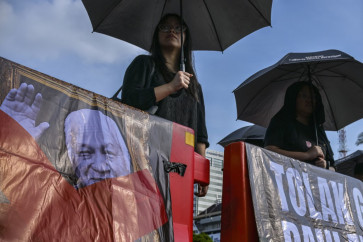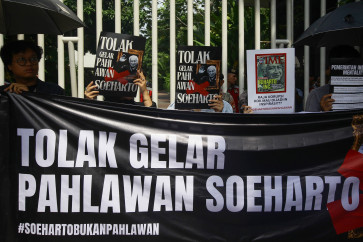Popular Reads
Top Results
Can't find what you're looking for?
View all search resultsPopular Reads
Top Results
Can't find what you're looking for?
View all search resultsView Point: Cow dung, black magic and the Criminal Code
Recently I read about two young Indonesian high school girls who managed to make natural air fresheners out of … cow dung! No, seriously
Change text size
Gift Premium Articles
to Anyone
R
ecently I read about two young Indonesian high school girls who managed to make natural air fresheners out of … cow dung! No, seriously. In fact, Dwi Nailul Izzah and Rintya Aprianti Miki won a gold medal for this at the Indonesian Science Project Olympiad. Holy cow! Are there alchemists or wizards in our midst?
Neither. They simply collected fresh cow manure, fermented it for three days, mixed it with coconut water and distilled it to eliminate impurities. Seven days later, lo and behold, these two innovative scientists had created an environmentally friendly, human-healthy and inexpensive air freshener! Transforming cow dung into gold — now that’s what I call magic!
If Dwi’s and Rintya’s “magic” is based on science, the “magic” in our new Criminal Code (KUHP) is based on the irrational. If the dung-to-air-freshener transformation is useful and environmentally friendly, the planned “colonial” to “modern” revision of the KUHP is backward and destructive. Take for example the push to make santet (black magic) a crime in the new provisions proposed (Article 293).
Huh? Isn’t that like trying to put a square peg in a round hole? Black magic, sorcery and the occult in general is based on the invisible and the hidden, and operates in the realm of the supernatural, don’t they?
So how can they be regulated by law that is rational in nature, requires empirical evidence and reliable means of proof? Do you, dear reader, sense an insurmountable contradiction here? How can you make something illegal that you can never forensically prove in court?
Yes, I know, this is so idiotic it leaves you smacking your forehead and vigorously shaking your head — and yet it is what our House of Representatives (DPR) is being asked to approve.
In case that’s not enough for you, 52 members of Commission III (on legal affairs, human rights and National Police) of the DPR are planning to go on a comparative study tour to Holland, France, the UK and Russia, (among other places) to study sorcery laws in those countries.
It’s got to be a joke, right? And a very expensive one at that, costing Rp 6.5 billion (US$666,120) in taxpayers’ money! The members of Commission III will have to look very hard to find anything useful in Paris, London or The Hague — after all, the West stopped burning witches centuries ago!
If they want to study sorcery, why don’t they go to Cameroon, Vanuatu or Papua New Guinea where black magic practitioners are rife, and laws prohibiting it common? Or perhaps these aren’t quite the travel destinations our high-flying legislators had in mind?
There are other controversial passages as well. Article 483 penalizes adulterers and people living out of wedlock. Of course, conservative Muslims will be pushing this one — ironically, given how many of their lawmakers it could be applied to, if recent scandals are any guide.
And Article 266 increases the sanctions for insulting the President, an offense decriminalized by the Constitutional Court (MK) in 2006! Now it will be five years if you’re caught thumbing your nose at our very sensitive Prez. Better hurry, folks, before the DPR legislates an end to freedom of expression.
Then there’s Article 212, which forbids the teaching of communism/Marxism-Leninism — hardly a threat, one would have thought, in these post-Cold War days, with capitalism triumphant even in China!
Articles 300 and 301 restrict wire-tapping, and would likely further diminish the powers of the besieged Corruption Eradication Commission (KPK). This is one provision I expect most legislators will support, given that so many of them have been proved corrupt.
Yep, the new KUHP looks pretty ugly, doesn’t it? Not surprising, given its history. The KUHP was introduced by the Dutch in 1918 and amended in 1958. Fresh attempts to revise it started in 1982, when a team was formed for this purpose. A draft appeared in 1991, and was revised again in 1993 to “harmonize with international conventions”, but only completed in 1999. From 2000 to 2004, this draft was discussed in seminars and submitted to the President in 2007.
However, it met with public protests from both sides of the debate, causing further delay, until finally it was submitted to the DPR this year.
They say that practice makes perfect, right? Not necessarily. The two young scientists were able to transform cow dung into something useful in seven days. But three decades of repeated revisions, producing draft after draft, has only “fermented” into a pile of stinking cow dung, on which few can agree.
Perhaps the unitary Indonesian state isn’t so unitary after all, given there are so many unresolved, long-standing rifts and disagreements among its members? That’s certainly why the drafting of the KUHP took so long — and why it’s so controversial and contradictory. It is not easy to create consensus in this complex and diverse nation, and better not to force it on our very politically aware population.
One thing is for sure — if this version of the KUHP passes, it will be a dangerous mess. It will be a marriage between the worst of the authoritarian New Order and the narrow-minded, distorted “religious” political conservatives of the so-called Reform Era — a step backward toward the dark ages.
And it is more proof that the DPR has pretty much lost the plot on policy now, and can’t be trusted. Public aversion to the formal legal system is high anyway that now people rely more on informal justice delivery systems: religious, adat (traditional law), hired criminals and … black magic.
Oh dear: maybe Article 293 of KUHP will turn out to be self-fulfilling prophesy?
The writer (www.juliasuryakusuma.com) is the author of Jihad Julia.










